Photographs: Jahnavi Sheriff
When one advances in practices, one can incorporate the more advanced yogic poses to deepen one's meditation. In Hatha yoga or the yoga of the mind-body culturing, these poses have an appeal that extends beyond the cosmetic or curiosity factor. In psychic parlance, these poses are said to remove the granthis or knots that hold us back in our spiritual practice.
On the physical level too, these poses impact us equally powerfully. After the initial strangeness of assuming them, you will find that the body relaxes its tensions and eases into the pose, thus making you more supple, flexible. The fact that you are able to hold these poses for long, without twitching or fidgeting as happens with beginners, will also help build will-power and physical and mental stamina.
Amongst the poses explained below, in both the apanasana and advasana the breath deepens. In gupta padmasana the entire body experiences a powerful opening up that removes hidden stresses and tensions. The subtle muscle mass, called faschia, is also worked deeply, as also the major glands that impact our moods and self-esteem. The nadanusadhan makes it easier for you to meditate for long without discomfort.
Here, Shameem Akthar, yogacharya trained with the Sivananda Yoga Vedanta Center, shows you five unusual yoga poses that will help you deepen your meditation.
For more of Shameem's yoga writings and workshops log into http://jaisivananda.blogspot.com.
(This column only seeks to share the author's enthusiasm towards yoga. Yoga is best learnt under expert guidance.)
Veerasana: The thinking warrior pose
Image: The thinking warrior poseAvoid: If having knee pain.
Benefits: This pose, if you switch legs, helps balance both brain hemispheres, marrying our emotional with the logical side. It is said to calm the nervous system, due to a powerful contact between the heel and what is called vajra nadi, a master acupressure point that impacts the parasympathetic nervous system.
Gupta padmasana: The hidden lotus pose
Image: The hidden lotus poseThis can be done only by those already able to do the lotus pose. Sit in the lotus pose. Reach palms on ground in front, as if going on fours, coming up on your knees.
Then lie on your stomach, with legs still folded in the lotus. Press hands behind into the namaste pose. Shut eyes, resting chin on the ground. Hold as long as possible, meditatively.
Benefits: Is said to remove all hidden tensions and negativities out of the body. Gives one of the most powerful stretches to the entire body. It impacts the urogenital system superbly, affecting our moods positively.
Nadanusadhana: The practice of hearing the subtle sound pose
Image: The practice of hearing the subtle sound poseSit in a loose cross-legged pose. Tie a scarf around the legs, slightly below the knees as shown.
Place hands in mudras (hand gestures) of your choice (most common one is the gyan mudra, with tips of index finger touching the tip of thumb of each hand).
Shut your eyes. You can hold this pose for as long as possible.
Benefits: This pose can be used for long meditations, since there is less pressure on the knees and lower back, which can hurt meditators after a while.
Apanasana: The downward flowing energy pose
Image: The downward flowing energy poseLie on your back. Fold both legs at knees, placing knees close to hips as shown. Place one hand on the stomach, other alongside body.
Shut eyes. Focus on the stomach's up-down movement as it keeps pace with the breath. This pose is also one of those in which long meditation is easy.
Benefits: This is the safest meditation pose to assume. The folded legs prevent the meditator from falling asleep (since they will drop to the side, if the person sleeps).
The breath becomes naturally deep, removing tensions from both body and mind. A very healing, soothing meditative pose.
Advasana: The prone corpse pose
Image: The prone corpse poseLie on your stomach. Stretch out legs behind, flaring feet away from each other, or placing them so the big toes touch and the heels are away.
Place chin on ground, as well as forehead, ensuring the nose is not feeling pressed down. Pass palms overhead, as shown, bringing them together to form the prayer gesture/namaste.
Hold for as long as is comfortable.
Benefits: Though this pose requires some getting-used-to, it is also a safe pose that helps the practitioner remain in meditation for long.
Deepens breath powerfully, working on the parasympathetic nervous system to create a healing flow in the mind and body.

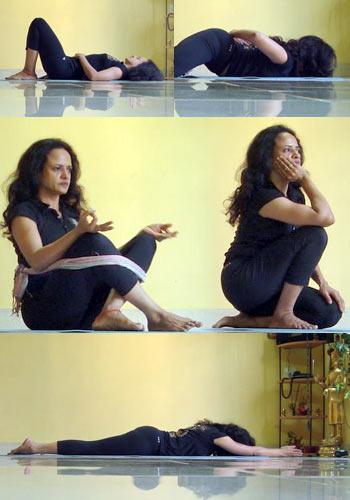
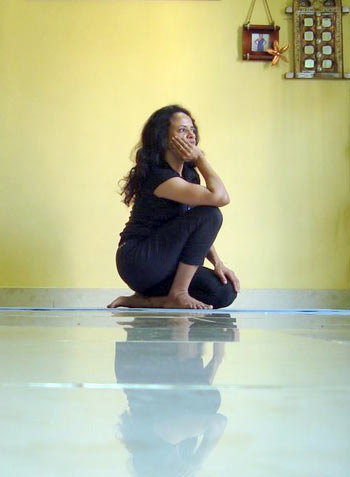
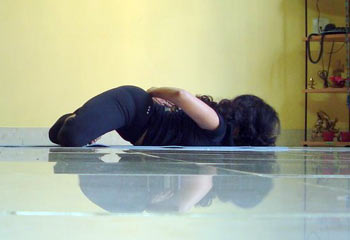
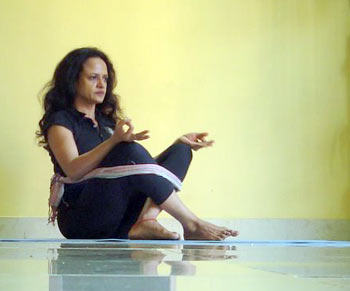
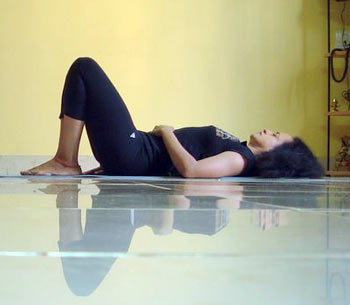
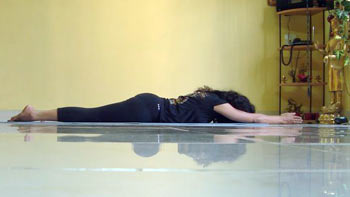
Comment
article